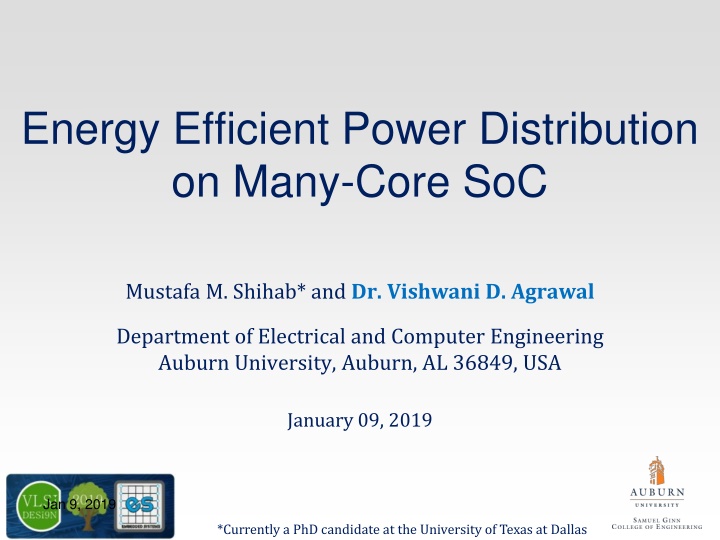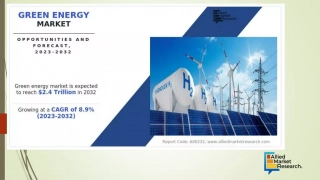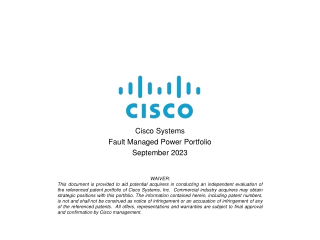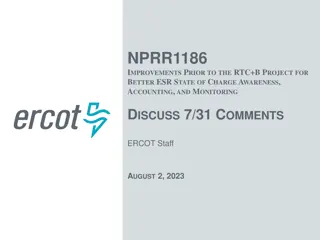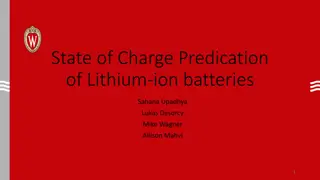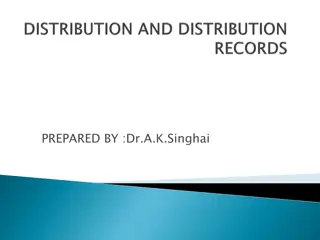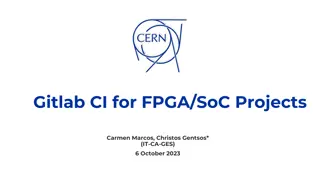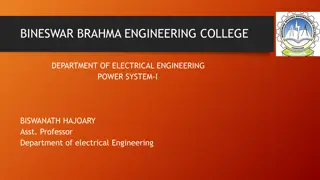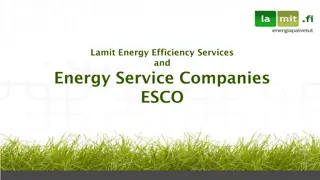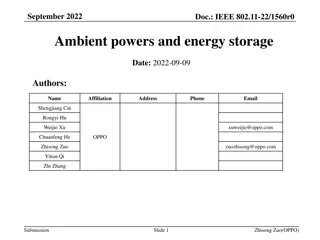Energy-Efficient Power Distribution on Many-Core SoC
This study explores energy-efficient power distribution on many-core System-on-Chip (SoC), addressing I2R power loss, challenges, proposed scheme, results, and future work. It focuses on the on-chip power distribution network, issues with present-day on-chip power grid, and solutions for optimizing power supply systems.
Download Presentation

Please find below an Image/Link to download the presentation.
The content on the website is provided AS IS for your information and personal use only. It may not be sold, licensed, or shared on other websites without obtaining consent from the author.If you encounter any issues during the download, it is possible that the publisher has removed the file from their server.
You are allowed to download the files provided on this website for personal or commercial use, subject to the condition that they are used lawfully. All files are the property of their respective owners.
The content on the website is provided AS IS for your information and personal use only. It may not be sold, licensed, or shared on other websites without obtaining consent from the author.
E N D
Presentation Transcript
Energy Efficient Power Distribution on Many-Core SoC Mustafa M. Shihab* and Dr. Vishwani D. Agrawal Department of Electrical and Computer Engineering Auburn University, Auburn, AL 36849, USA January 09, 2019 Jan 9, 2019 *Currently a PhD candidate at the University of Texas at Dallas
Outline Motivation On-Chip Power Distribution Network I2R Power Loss Problem Statement Proposed Scheme Results Challenges, Development and Future Work References Jan 9, 2019 2
Motivation In 1965, Intel co-founder Gordon Moore observed and formulized that - transistor density is doubling every 18 months 5,000,000,000 Transistors Intel Xeon Phi processor Sources: http://www.computerhistory.org/semiconductor/timeline.html http://en.wikipedia.org/wiki/Transistor_count Jan 9, 2019 3
On-Chip Power Distribution Network Power Supply System From Board to Chip: Source: N. Weste et al., CMOS VLSI design: A Circuits and Systems Perspective 2006 4 Jan 9, 2019
On-Chip Power Distribution Network Power Distribution for Standard Cell Layout: Source: N. Weste et al., CMOS VLSI design: A Circuits and Systems Perspective 2006 Jan 9, 2019 5
On-Chip Power Distribution Network Power Distribution Grid : Source: N. Weste et al., CMOS VLSI design: A Circuits and Systems Perspective 2006 6 Jan 9, 2019
On-Chip Power Distribution Network Issues with Present Day On-Chip Power Grid: IR Drop L(di/dt) Noise Electromigration Signal Delay Uncertainty On-chip Clock Jitter Noise Margin Degradation 7 Jan 9, 2019
I2R Power Loss Long Distance Power Grid For a 100 mile long line carrying 1000 MW of energy: @ 138 kV power loss = 26.25% @ 345 kV power loss = 4.2% Source: American Electric Power Transmission Facts , http://bit.ly/11nUMvf @ 765 kV power loss = 1.1% to 0.5% Jan 9, 2019 8
I2R Power Loss I2R Loss in On-Chip Power Distribution Network: Increasing Current Density Increasing I2R Loss Technology Scaling Increasing Wire Resistivity 9 Jan 9, 2019
Problem Statement We propose a scheme for delivering power to different parts of a large integrated circuit, such as cores on a System on Chip (SoC), at a higher than the regular (VDD) voltage The increase in voltage lowers the current on the grid, and reduces the I2R loss in the on-chip power distribution network 10 Jan 9, 2019
Proposed Scheme Present Day On-Chip Power Distribution Network: 11 Jan 9, 2019
Proposed Scheme Proposed High-Voltage On-Chip Power Distribution Network: 12 Jan 9, 2019
Proposed Scheme Present Day Low-Voltage (VDD = 1V) Power Grid (9 loads) Jan 9, 2019 13
Proposed Scheme Proposed High-Voltage (3V) Power Grid (9 loads) Jan 9, 2019 14
Results Distribution Voltage vs. PDN Efficiency: Load: 1W Grid Resistances: 0.5 (ITRS 2012) Jan 9, 2019 15
Results Conventional vs. High-Voltage PDN: Power Consumption Grid Power (W) High-Voltage PDN (Ideal Converter) 0.01 0.07 0.19 0.40 0.78 2.64 5.48 18.82 High-Voltage PDN (Non-Ideal Converter) 0.02 0.11 0.39 1.21 2.68 9.12 18.97 63.3 Number of Loads Load Power (W) Present Day PDN 0.13 0.67 1.69 3.57 7.02 23.76 49.32 169.40 1 4 9 16 25 64 100 256 1 4 9 16 25 64 100 256 Load: 1W Grid Resistances: 0.5 (ITRS 2012) DC-DC Converter: LTC 3411-A (Ideal: 100% Efficiency, Non-Ideal: 80% Efficiency) 16 Jan 9, 2019
Results Conventional vs. High-Voltage PDN: Power Delivery Efficiency Efficiency High-Voltage PDN (Ideal Converter) 98.58 98.17 97.96 97.58 96.97 96.04 94.80 93.15 High-Voltage PDN (Non-Ideal Converter) 98.04 97.32 95.85 92.97 90.32 87.53 84.05 80.18 Number of Loads Regular PDN 88.50 85.65 84.19 81.76 78.08 72.93 66.97 60.18 1 4 9 16 25 64 100 256 Load: 1W Grid Resistances: 0.5 (ITRS 2012) DC-DC Converter: LTC 3411-A (Ideal: 100% Efficiency, Non-Ideal: 80% Efficiency) 17 Jan 9, 2019
Challenges and Developments Challenges with DC-DC Converter Design: Efficiency Power Area Output Drive Capacity Fabrication Developments: Input Voltage: 3.3 V Output Voltage: 1.3 V 1.6 V Output Drive Current: 26 mA Efficiency: 75% - 87% Input Voltage: 3.6 V & 5.4 V Output Voltage: 0.9 V Output Drive Current: 250 mA Efficiency: 87.8% & 79.6% Sources: B. Maity et al., Journal of Low Power Electronics 2012 V. Kursun et al., Multi-voltage CMOS Circuit Design. Wiley, 2006 Jan 9, 2019 18
Challenges, Developments and Future Work Future Work: DC-DC Converters: Have the capability of driving output loads of reasonable size Have power efficiency of 90% or higher Meet the tight area requirements of modern high-density ICs Be fabricated on-chip as a part of the SoC Also have regulator capability to convert a range of input voltage to the designated output voltage Higher Efficiency + Higher Output Drive Smaller Cores High-Voltage PDN DC-DC Converters SoCs Jan 9, 2019 19
Thank You 20 Jan 9, 2019
